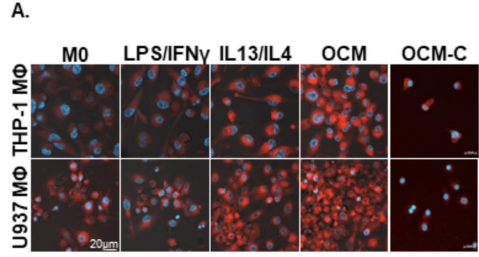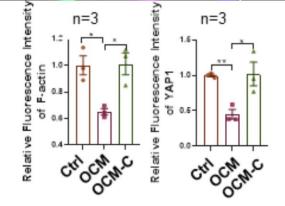|
Journal Article Cites Cleanascite™ To Determine the Role of Fatty Acids in Tumor-Associated Macrophage Polarization in Ovarian Cancer Biotech Support Group reports on an article, describing the simplicity and efficiency of their lipid clearance sample preparation from omental conditioned medium (OCM), to in a study of protumoral M2-like macrophages in ovarian cancer. News Release
Journal Article Cites Cleanascite™ To Determine the Role of Fatty Acids in Tumor-Associated Macrophage Polarization in Ovarian Cancer
MONMOUTH JUNCTION, NJ, September 9, 2024 -- Biotech Support Group reports on an article, describing the simplicity and efficiency of their lipid clearance sample preparation from omental conditioned medium (OCM), to in a study of protumoral M2-like macrophages in ovarian cancer. The citation is:
Wang, H., Yung, M.M., Xuan, Y. et al. Polyunsaturated fatty acids promote M2-like TAM deposition via dampening RhoA-YAP1 signaling in the ovarian cancer microenvironment. Exp Hematol Oncol 13, 90 (2024). https://doi.org/10.1186/s40164-024-00558-8
Peritoneal metastases frequently occur in epithelial ovarian cancer (EOC), resulting in poor prognosis and survival rates. Tumor-associated-macrophages (TAMs) massively infiltrate into ascites spheroids and are multi-polarized as protumoral M2-like phenotype. However, the impact of omental conditioned medium/ascites (OCM/AS) on TAM polarization and its function in tumor progression remains elusive. The article states “Recent studies have suggested that lipid accumulation and metabolism are associated with the differentiation and activation of protumoral TAMs. Hence, we examined the lipid droplets (LDs) in MФs, which are cellular storage organelles for neutral lipids. …the removal of free fatty acids in OCM by Cleanascite™ attenuated LDs deposition in OCM-C MФs (macrophages polarized in OCM pretreated with Cleanascite™) (Fig. 4A), indicating M2 MФs and OCM-MФs exhibited higher lipid accumulation and metabolism….Likewise, we demonstrated that the cellular ROS levels in OCM/AS-MΦs derived from PBMC MΦs were significantly upregulated, whereas the addition of Cleanascite™ mitigated the increased ascites-mediated ROS level, indicating that the accumulation of intercellular UFAs is responsible for the enhanced ROS production in OCM-MФs (Fig. 4D.” The article goes on to state “In contrast, removing lipids by Cleanascite™ remarkably prevented the reduction of YAP1 in OCM-MΦs (Fig. 5G).
From
Figure 4A From
Figure 5G.
This study revealed that PUFAs-enriched OCM/AS of EOC promotes M2-like TAM polarization through RhoA-YAP1 inhibition, where YAP1 downregulation is required for accelerating protumoral M2-like TAM polarization, thereby causing immunosuppression and enhancing tumor progression. “We now have over thirty references, showing Cleanascite™ use in helping to identify a characteristic feature of in vitro cell response. Notably, this is the fifth reference that specifically investigated the role of lipids in macrophage polarization in cancer cell lines. Unlike alternative lipid-depletion methods that use solvents, Cleanascite™ is an aqueous suspension product and so it is very compatible with cellular models of disease. The essential requirement is the maintenance of cellular activity after lipid depletion, to determine whether lipid factors are associated with phenotypic changes in cultured cells” states Swapan Roy, Ph.D., President and Founder of Biotech Support Group. Download whitepaper entitled “Cleanascite™ - Lipid Removal and Cell Response Applications”, visit: For
more information visit: Cleanascite™
Lipid Removal Reagent and Clarification,
at
Keywords: Lipid depletion, lipid metabolism, Cleanascite™, Tumor microenvironment, Immunometabolism, TAM polarization, Ovarian cancer and ascites, Polyunsaturated fatty acids, RhoA-YAP1 signaling
About Biotech Support Group LLC
Converging
with cultural and technological disruptions forthcoming in
healthcare, Biotech Support Group develops methods for cost effective
and efficient sample prep essential for these expanding markets.
Following a tiered business strategy, the company continues its
growth in the consumable research products area supporting the
rapidly expanding installation of LC-MS instrument and computational
infrastructure. For
this market, key products include: AlbuVoid™ and AlbuSorb™ PLUS
for
albumin & IgG depletion, Cleanascite™
for lipid adsorption, HemogloBind™ and HemoVoid™ for hemoglobin
removal, and NRicher™ for targeted proteomics and family specific
proteome enrichment.
For more information, go to http://www.biotechsupportgroup.com. For Business Development, contact: Matthew Kuruc 732-274-2866, mkuruc@biotechsupportgroup.com |

- About
- Products
- Hemoglobin Removal Kits
- Lipid Removal & Clarification
- Urine Protein & Low Abundance Enrichment
- Class Specific Enrichment
- Sample Prep Mass Spectrometry
- Functional & Chemical Proteomics
- Genomic Sample Prep
- Accessories
- Technical Resources
- References
- Publications & Reports
- FAQs
- Case Studies
- Cleanascite™ Unlocks Insights into Lipid-Driven Tumor Immunosuppression
- NRicher™ Bead Platform Provides Unique Sub-Proteome Biases And Fit For Purpose Opportunities for Targeted LC-MS Quantification
- BSG Products To Assist in Analyzing Macrophage Polarization
- Ectodomain Shedding and Enrichment of the Soluble Membrane Proteome
- Investigate out of the Venn Diagram box
- Methods to selectively deplete or purify Hemoglobin from Dried Blood Spots (DBS)
- The Utility of HemoVoid™ is Demonstrated in 3 Proteomic Investigations Identifying Potential Disease Specific Biomarkers
- The 4 common features of our sample prep products, known as the BSG Advantage, are highlighted in a selection of journal references.
- AlbuVoid™ Workflows Advance Cell Secretome Proteomics
- Lipid Removal for Phenotypic Cell Response in Cancer Research
- The Influence of Sample Prep Bias on LC-MS Targeted Peptide Quantification in Serum Proteomics
- Re-imagining proteomics for developing precision medicine biomarkers of the innate immune response in SARS-CoV-2
- Patent Application Describes New Proteomic Methods to Monitor Protease Inhibitor Function During Covid-19 Infections
- Efficient Hemoglobin Removal Advances Red Cell Proteomics Offering Many New Insights Into Inflammation and Infectious Disease
- The Potential for New Blood Biomarkers in the Management of COVID-19 Disease
- Establishing the Utility of HemoVoid™ and HemogloBind™ as Enrichment Tools for Proteomic Analysis of Red Cells and Whole Blood in Parkinson’s Disease
- Species Diversity Supported By BSG Products
- Poster Report Describes Loss of Functional Serpin Activity In Cancer Patient Blood
- AlbuVoid™️ PLUS & AlbuSorb™️ PLUS Evaluating Different Windows of Observation Solves The Many Challenges of Serum Proteomics
- Tackling the Challenges of Serum Proteomics
- Lipid Removal Sample Prep for Cell Response Applications
- Sample Prep for Proteomic Analysis of Saliva
- Biotech Support Group Featured in Book, "Functional Proteomics – Methods and Protocols"
- Sample Prep Liquid Biopsy Products Suitable for Proteomic Profiling of a Variety of Body Fluid Sample Types
- Albumin and High Abundance Depletion
- Using HemogloBind™ as a Hemoglobin Binding Reagent
- Diverse technologies available for researchers to selectively bind or enrich exosomes and extracellular vesicles.
- Stroma Liquid Biopsy™ Biomarkers Profile Pan-Cancer Dysregulation of the Serum Proteome
- Diverse Depletion and Enrichment Technologies Enhance Simplicity and Efficiency of Obtaining Quality Proteomic Information
- Use On-Bead Digestion to Improve Time Required for Serum Digestion
- Using AlbuVoid™ as a Serum Protein Enrichment Kit in Functional Proteomics
- Using Cleanascite™ as a Lipid Absorption and Clarification Reagent
- Using HemoVoid to Remove Hemoglobin Before Analysis
- Blog
- Contact
- Liquid Biopsy

